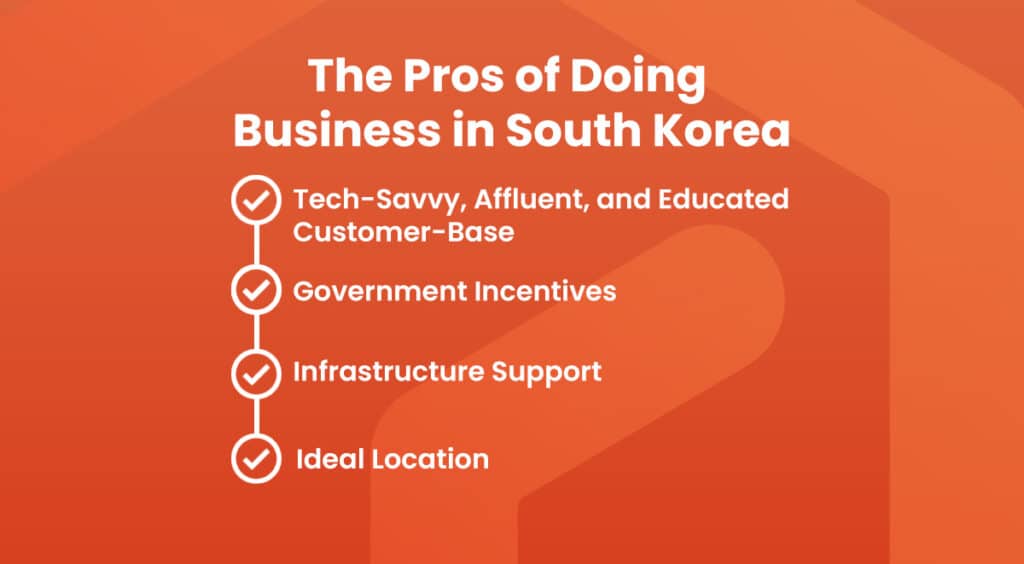Inquivix HQ
1-903, 18 Eonju-ro 146-gil,
Gangnam-gu, Seoul, Korea
06057

South Korea is considered a miracle economy because of its transformation from poverty to being the world’s 12th largest economy in GDP. With giants like Hyundai Motors, Samsung Electronics, and many other brands powering the economy, South Korea is already an attractive market for companies to build a thriving business. There are many pros and cons to starting a business in South Korea as a foreigner, and with a population of over 51 million, there are plenty of opportunities for tapping this market. However, foreign businesses that are considering the entrance to South Korea will need to be aware of a few things.
This article takes a look at a few of the major points you need to be aware of regarding the Foreign Investment Promotion Act and Foreign Exchange Transaction Act which the South Korean government has in place to regulate companies that are started by foreigners. Furthermore, the types of businesses that can be started and some of the unique cultural aspects of conducting business in the country. Let’s look at how you could start your company in South Korea.
The Pros and Cons of Starting a Business in South Korea as a Foreigner
Many foreign companies from the likes of Starbucks to Nike have already entered the South Korean market and are operating successfully. Though South Korea is a lucrative market, it has its own challenges. Therefore, foreign investors and companies that wish to take their brands here need to have an understanding of the pros and cons of doing business in Korea.
The Pros of Doing Business in South Korea
The South Korean economy has been growing at a stable rate and is one of the most attractive markets to expand your business. So, why should you be doing your business in South Korea?

A Tech-Savvy, Affluent, and Educated Customer-Base
With a very high smartphone penetration, South Korea has some of the most tech-savvy consumers in the world. They also have some of the highest literacy rates in the world, and they have a high disposable income. Customers are perceptive and are ready to spend money on products or services that are delivered to a high standard of quality.
Korean companies like Samsung have flourished domestically with their high-tech consumer electronics due to this smart customer base. A foreign company can easily profit by tapping into this market. A business entering South Korea will also need to understand both online and offline strategies to reach its target market and convey the value they are offering to customers.
Government Incentives
A foreign corporation can benefit greatly from the support of the South Korean government which encourages more foreign direct investment to come in through favorable tax laws. The tax benefits they provide are not only a financial incentive in the present but an indicator that this position of the government will likely remain favorable to foreign corporations for the foreseeable future.
Infrastructure Support
A foreign corporation entering South Korea can benefit immensely from some of the world’s finest infrastructure. From high-speed internet to a well-developed transportation system that includes airports, road networks, ports, and railways, the country’s infrastructure is capable of supporting business activities of any scale. The South Korean government has established special trade zones with tax benefits to facilitate companies. Everything from small businesses to large multinational corporations can find all the resources necessary to make their venture a success.
Ideal Location
South Korea is located between Japan and China, two very lucrative markets in the East Asian region. This offers the opportunity to expand into other markets in the region. This means that once your business gets a foothold in South Korea, it will be easier to grow brand awareness, grow, and eventually spread to neighboring markets in the region.
The Cons of Doing Business in South Korea

Legal and Documentation Requirements
While the support provided by the government through tax benefits is great for foreign-invested companies, their heavy involvement in business activities means there is a lot of red tape and paperwork to process. Foreign companies have to be aware of the correct forms to fill out, visa requirements, and other regulations while operating in the country.
Unique Cultural Challenges
South Korean culture is unique with its own set of traditions and practices. For example, their social hierarchy which pays special attention to seniority. Practices like these have penetrated into their business culture as well. Also, there is the limitation of communication due to language. As a foreigner operating a business in South Korea, you need to have a good understanding of this every time you deal with a Korean company or government official.
[H4] Domestic Digital Marketing Landscape
Any business operating in today’s market considers digital marketing to be an essential aspect of its operations. However, South Korea has many differences from global digital marketing. You need to be aware of these differences to make effective business decisions. One such difference is the digital platforms used by the South Koreans. While global platforms like Instagram, Facebook, and YouTube are popular, there are a lot more established domestic platforms that are much more popular such as Naver, KakaoTalk, Naver Blog, Kakao Story, etc.
In fact, Naver is the most popular search engine in South Korea, placing Google second. Over 90% of mobile phone users rely on the KakaoTalk app to communicate with their friends, follow brands, and do their shopping. Therefore digital marketing in South Korea, including SEO, social media marketing, and others needs specific insights and strategies. Foreign companies will need digital marketing support from an experienced Korean marketing agency if they plan on starting business activities in this country.
The Types of Companies You Can Set Up under the FIPA
The South Korean government has facilitated foreign investments and companies with several policies. The Foreign Investment Promotion Act (FIPA) allows a foreigner to set up a company locally under certain conditions. According to FIPA, if a foreigner has invested not less than KRW 100 million for managerial participation and acquired not less than 10% of the company stocks with voting rights, it is recognized as a foreign-invested company. It is then recognized as a domestic corporation set up under the Korean Commercial Code.
There are several types of companies you can set up as foreign-invested companies under the FIPA.

Subsidiary
According to regulations in FIPA, a foreign subsidiary can be set up with the same legal and corporate eligibility criteria that a domestic company in South Korea has to adhere to. This means that all the benefits domestic companies receive from the government such as cash subsidies and tax benefits would apply. The subsidiary would be owned and managed by a local while a minimum foreign investment of 100 million Korean Won would have to be made by the foreign entity. This type of corporation is also known as a foreign direct investment (FDI) company.
Many types of subsidiaries can be set up. These are stock companies, limited companies, limited liability companies, limited partnership companies, and unlimited partnership companies. It must be noted that stock companies and limited liability companies are easier to incorporate than other types of subsidies.
Private Business
An individual foreign businessman could set up a private business that would be run by them. This operation also falls under the FIPA regulations and would be considered a foreign investment. Similarly to the subsidiary, the foreign business owner would have to invest a minimum of 100 million Korean Won to start a new company or acquire one to receive all the benefits of an FDI.
The Types of Foreign Companies You Can Set Up under the FETA
Alternatively, a branch or liaison office could be set up according to the Foreign Exchange Transaction Act (FETA) instead.

Branch Office
The establishment of a branch office is dictated by the Foreign Exchange Transaction Act (FETA). The local branch office established in South Korea would be allowed to engage in profit-making business activities for their head office located in the company’s country of origin. A branch office is considered a permanent enterprise and will receive tax incentives and other benefits that domestic companies get from the government.
To set up a foreign branch office, the company would need to go through the Korean company registration process and be approved by the court. The branch office would also need to have the company name identical to the headquarters and would also need to appoint a representative who reports to the head office.
Liaison Office
The liaison offices work under the FETA as well. However, a liaison office cannot engage in profit-making activities like a branch office is allowed to. A liaison office can perform market surveys, research, and promotional activities. Since they do not generate any revenue, liaison offices do not need to pay any taxes.
A liaison office is also the simplest form of company to start. All you need to do is get registered at the district tax office to apply for a business license. There is no need to register at the court like you would for a branch office.
Planning to Start Your Business in Korea?

As we discussed above, a foreign entity planning to establish a business in South Korea has several options with the support of the South Korean government. Though there are some challenges in entering this unique market, it offers opportunities for businesses to thrive and grow. Whether it is a branch or liaison office, a subsidiary, or a private business in Korea, you will need an experienced guide to help you navigate the digital landscape of the country. This is where Inquivix comes in. We have years of expertise in helping our clients get established in South Korea with the crucial digital marketing services they need to make their brands flourish. We handle everything from web design & development, and search engine optimization, to PPC advertising, and social media marketing.
To learn more about how we can help your business get a foothold in South Korea, visit Inquivix today!
FAQs
It is not difficult, but not simple either. First, you need to understand the local culture and consumer behavior. Then use online platforms to your advantage with strategies like SEO, PPC advertising, social media marketing, and others. You can use influencer marketing to increase the online visibility of your brand as well. But doing all these can be complicated while you are trying to run your business in a new market. Therefore the best thing you can do is to partner with a Korean digital marketing agency. They will do the marketing allowing you to focus on running the business.
Yes. There is an affluent, educated, and tech-savvy customer base that is ready to spend money on brands that offer great quality products or services. The government provides plenty of incentives to attract foreign investment, and the country has some of the most advanced infrastructure needed for many high-tech companies. South Korea is also a great place to get a foothold in East Asia if a brand wishes to expand to further territories like Japan and China.
